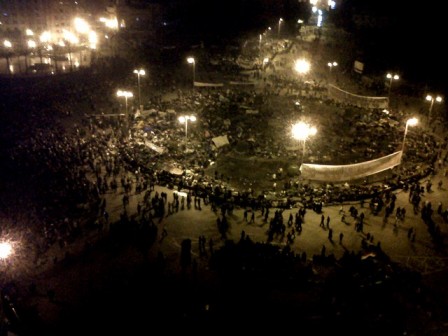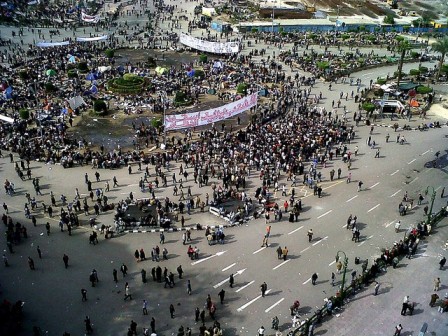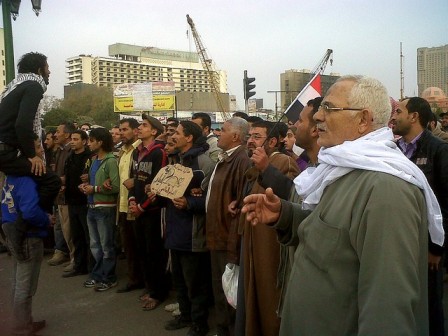Will The Secular Arab Revolution’s Domino Effect Reach Iran?

NEWS JUNKIE POST
Feb 6, 2011 at 7:25 amWhile the outcome of the Egyptian revolution is impossible to predict and hard to forecast, what the events have fully exposed are the incredible shortcomings of the United States foreign policy. Analysts at the CIA, diplomats at the State Department and the so called brilliant people of the Council On Foreign Relations never saw the uprising in Egypt coming even so it was a highly predictable event in the aftermath of the Tunisian Jasmine revolution. The Obama administration was behind the train of history, but caught up a few days later by throwing its long term and key ally Mubarak under the bus.
The decision to dump Mubarak reached unanimous approval in Congress, as if America can only unite if a threat to the empire comes along. After a couple of days of hesitation, the US administration is back meddling in Egypt’s internal affairs to try to stir the revolution in a way that would protect US and Israeli interests in the region. Two tracks were in the work with Secretary of Defense Gates, Admiral Mullen and Secretary of State Clinton putting pressure through different channels. The first track-favored by Israel- is to support a semi-peaceful military coup, the second one is to back Omar Suleiman, the newly appointed vice president and Mubarak’s right hand man for the past 20 years. Even so the Obama administration, by dumping Mubarak, is trying to stay away from the wrong side of history, picking Suleiman seems to be another short sighted decision.
Is Omar Suleiman The Wrong Man To Head A Transition Government?
Washington’s hasty pick of Suleiman has to be put in a wider context. The Obama administration is desperately trying to stabilize the situation in Egypt to prevent a rapid spread of the revolution to the client or vassal states of the United States in the region. Pressure for democratic reforms has already been exercised by Washington on Jordan, Yemen and Iraq.
In Jordan, the King just dissolved his cabinet. In Iraq, prime minister Al-Maliki just announced on Saturday that he would not seek a third term, cut his own pay in half, and amend the constitution to put a two terms limit on future prime ministers. As far as Egypt, the US administration is, once again, not reading the situation properly. Suleiman was Egypt’s head spy for 20 years, and has almost as much blood on his hands than his boss Mubarak. For this reason, he will not be deemed acceptable by the protesters as a viable solution to head Egypt in this transition period.
On Sunday, in an unexpected move, the Muslim Brotherhood started talks with Omar Suleiman. This can be considered a shrewd attempt on the part of Suleiman to split the opposition. However, it could also discredit the Muslim Brotherhood in the eyes of the Tahrir Square movement, providing the organization make a side deal with the Mubarak regime while it is still in power.
A Muslim Brotherhood Takeover: An Unlikely Outcome
In Tahrir Square, you don’t hear the slogan of the Muslim Brotherhood “Islam is the solution”, instead the Egyptian people are expressing secular democratic demands for social justice, freedom of speech and transparency. Last Friday in Tahrir Square, Coptic Christians protected their Muslim brothers during the prayers, and today a mass was held by Coptic Christians in what has become the center and focus point of the revolution. Muslims and Coptic Christians, who represent more than 10 percent of Egypt’s population, are united in this fight against the tyranny of Mubarak’s regime. This fact prove that the revolution is bridging traditional religious divide in Egypt.
A Muslim Brotherhood takeover has been used as a scare tactic by Mubarak for decades to convince the United States and Israel that he was indispensable to keep them from power. The argument was a fallacy then, and it is even more inaccurate now. However, both in Jerusalem and Washington, the threat of a Muslim Brotherhood takeover is still used as a scarecrow to keep meddling in Egypt’s internal affairs. US and Israeli’s news outlets, from across the political spectrum, are still wrongly echoing this fear originally concocted by Mubarak to keep his grip on power. In Israel especially, the argument constantly made by the Netanyahu administration-and of course duly amplify by AIPAC in the US- is that the Egyptian revolution could turned the same way the Iranian revolution did: An Islam fundamentalist takeover. It is completely unlikely, and as matter of fact the secular Arab revolution could revive the green movement in Iran, and topple the Ayatollahs.
Editor’s Note: All photographs by Mona Sosh
Related Articles
- December 23, 2011 Are Islamist Fundamentalists Hijacking The Arab Revolution?
- November 20, 2012 G. Mercier on RT: Israel Attack on Gaza Is Worse Than a Crime, It’s a Blunder
- February 11, 2011 Egypt After Mubarak: The Army Should Only Be The Revolution’s Guarantor
- July 3, 2012 Israel and America’s Duet “Bomb, Bomb, Bomb Iran!”: Back in the Limelight
- January 30, 2011 Arab People: From Powerless To Proud
- January 31, 2011 Toppling Of Mubarak: A Chance For Peace In The Middle East


















4 Responses to Will The Secular Arab Revolution’s Domino Effect Reach Iran?
You must be logged in to post a comment Login